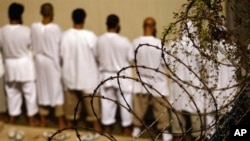Last year, U.S. President Barack Obama said the prison at Guantanamo Bay would be closed before the end of January, 2010. Three months after the deadline, families of Yemeni detainees, which make up about half of the prisoners held in Guantanamo, are hopeless and angry.
It has been eight and a half years since Bashir Nasser disappeared in Pakistan. His family says he left Yemen to go back to school where he was working towards an advanced degree in nursing. Four months after he left Yemen they got a letter from the Red Cross. Bashir was in Guantanamo.
Bashir's younger brother, Bessam, says he does not really know how his brother is doing because prisoners are not allowed to tell their families about the conditions in Guantanamo.
As far as Bessam knows, his brother has never been charged with a crime.
About half of the remaining 200 detainees in Guantanamo are Yemenis. In January, after reports that Umar Farouk Abdulmutallab, the failed Christmas bomber, was trained and armed in Yemen, U.S. officials said the already-scheduled release of many of the Yemeni prisoners would be delayed indefinitely.
Reports of increasing numbers of former Guantanamo prisoners traveling to Yemen to fight with al-Qaida in the Arabian Peninsula complicate the matter. Saeed al-Shehri, a former Guantanamo prisoner was released to a rehabilitation center in Saudi Arabia in 2007. He is now believed to be leading al-Qaida's operations in Yemen with several other former detainees.
But activists say keeping Yemeni prisoners in Cuba without charges is strengthening anti-Western sentiment in Yemen. Khaled Alansi, the director of HOOD, a Yemeni human-rights organization, says the families of the detainees were crushed when the deadline for closing Guantanamo came and went without the return of their family members.
Alansi also says it is not just U.S. security concerns that have prevented prisoner return. He says Guantanamo prisoners are also a pawn in a political and financial game between the United States and Yemen.
He says when the United States offered to return prisoners last year, Yemen responded by demanding funding for a rehabilitation center.
"The Yemeni government uses terrorism and fighting terrorism as a tool to get political and financial benefit," said Khaled Alansi. "They did not have anything to market themselves to the world, especially the United States, except fighting terrorism."
Like Alansi, Colonel Lawrence B. Wilkerson, former Chief of Staff to U.S. Secretary of State Colin Powell, also says most of the Guantanamo detainees were arrested without evidence against them.
But other U.S. officials warn some of the prisoners are too dangerous to release, and say that because they are being held as enemy combatants, they can legally remain in U.S. custody for the duration of the "War on Terror."
Some Yemeni officials say this "war" may never be truly over. Abdul Karim al-Iryani, a former prime minister, says the detainees should be returned to Yemen, and, if there is evidence against them, tried in Yemeni courts.
"You can never tell how anybody will behave after such enduring of suffering," said Abdul Karim al-Iryani. "Some people come out of suffering and behave well, some people come out more extremist. But is that a good excuse to keep them in jail forever? Is that justice or injustice?"
For years friends and families of Yemeni detainees have staged protests and solicited help from lawyers. But despite repeated promises for his safe return, Bashir's friends say their efforts have only gotten them in trouble.
Bessam says another one of his brothers and one of their friends were sentenced to 10 years in prison, after threatening to turn their peaceful protest movement violent. If his brother stays in Guantanamo, and Bessam continues speaking out against the detention - even without the threats - Bessam says he fully expects to be arrested too.
Frustration Mounts, as Yemeni Detainees Languish in Guantanamo











